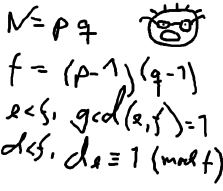POJ 2635 The Embarrassed Cryptographer
2016-08-24 21:28
791 查看
The Embarrassed Cryptographer
Description

The young and very promising cryptographer Odd Even has implemented the security module of a large system with thousands of users, which is now in use in
his company. The cryptographic keys are created from the product of two primes, and are believed to be secure because there is no known method for factoring such a product effectively.
What Odd Even did not think of, was that both factors in a key should be large, not just their product. It is now possible that some of the users of the system have weak keys. In a desperate attempt not to be fired, Odd Even secretly goes through all the users
keys, to check if they are strong enough. He uses his very poweful Atari, and is especially careful when checking his boss' key.
Input
The input consists of no more than 20 test cases. Each test case is a line with the integers 4 <= K <= 10100 and 2 <= L <= 106. K is the key itself, a product of two primes. L is the
wanted minimum size of the factors in the key. The input set is terminated by a case where K = 0 and L = 0.
Output
For each number K, if one of its factors are strictly less than the required L, your program should output "BAD p", where p is the smallest factor in K. Otherwise, it should output "GOOD". Cases should be separated by
a line-break.
Sample Input
Sample Output
| Time Limit: 2000MS | Memory Limit: 65536K | |
| Total Submissions: 14158 | Accepted: 3872 |

The young and very promising cryptographer Odd Even has implemented the security module of a large system with thousands of users, which is now in use in
his company. The cryptographic keys are created from the product of two primes, and are believed to be secure because there is no known method for factoring such a product effectively.
What Odd Even did not think of, was that both factors in a key should be large, not just their product. It is now possible that some of the users of the system have weak keys. In a desperate attempt not to be fired, Odd Even secretly goes through all the users
keys, to check if they are strong enough. He uses his very poweful Atari, and is especially careful when checking his boss' key.
Input
The input consists of no more than 20 test cases. Each test case is a line with the integers 4 <= K <= 10100 and 2 <= L <= 106. K is the key itself, a product of two primes. L is the
wanted minimum size of the factors in the key. The input set is terminated by a case where K = 0 and L = 0.
Output
For each number K, if one of its factors are strictly less than the required L, your program should output "BAD p", where p is the smallest factor in K. Otherwise, it should output "GOOD". Cases should be separated by
a line-break.
Sample Input
143 10 143 20 667 20 667 30 2573 30 2573 40 0 0
Sample Output
GOOD BAD 11 GOOD BAD 23 GOOD BAD 31 大数取模运算,这里的大数要转换成三位运算一次,否则会TLE,L的范围不大,可以先直接打表存下来。
#include<iostream>
#include<cstdio>
#include<cstring>
#include<cmath>
using namespace std;
const int m=1000001;
int prime[m],isprime[m],top=0;
void getprime()
{
memset(isprime,0,sizeof(isprime));
isprime[0]=isprime[1]=1;
for(int i=2;i<m;i++)
{
if(isprime[i]) continue;
prime[top++]=i;
if(i*i>=m) continue;
for(int j=i*2;j<m;j+=i) isprime[j]=1;
}
}
int main()
{
char a[110];
int aa[110];
int l;
getprime();
while(cin>>a>>l)
{
if(strlen(a)==1&&a[0]=='0'&&!l) break;
int len=(strlen(a))/3,you=strlen(a)-1;
for(int i=1;i<=len;i++)
{
int sum=0;
for(int j=you-2;j<=you;j++) sum=(sum*10)+(a[j]-'0');
you-=3;
aa[i]=sum;
}
if(you>=0)
{
int sum=0;
for(int j=0;j<=you;j++) sum=(sum*10)+(a[j]-'0');
aa[++len]=sum;
}
// cout<<len<<endl;
// for(int i=1;i<=len;i++) cout<<aa[i];
//cout<<endl;
int flag=0,tt;
for(int i=0;i<top;i++)
{
if(prime[i]>=l) break;
int ans=0;
for(int j=len;j>=1;j--) ans=((ans*1000)+aa[j])%prime[i];
if(!ans)
{
flag=1;
tt=prime[i];
break;
}
}
if(flag) cout<<"BAD "<<tt<<endl;
else cout<<"GOOD"<<endl;
}
return 0;
}
相关文章推荐
- POJ 2635 The Embarrassed Cryptographer
- poj 2635 The Embarrassed Cryptographer(数论)
- POJ 2635 The Embarrassed Cryptographer
- POJ 2635 The Embarrassed Cryptographer
- POJ 2635 The Embarrassed Cryptographer
- The Embarrassed Cryptographer--POJ 2635
- poj2635 The Embarrassed Cryptographer
- POJ 2635 The Embarrassed Cryptographer(JAVA)
- POJ-2635 The Embarrassed Cryptographer 万进制+素数筛选
- POJ 2635 The Embarrassed Cryptographer 高精度
- POJ 2635 The Embarrassed Cryptographer 大数模
- POJ 2635 The Embarrassed Cryptographer(整数刷新,千进制取模)
- POJ 2635 The Embarrassed Cryptographer
- poj-2635-The Embarrassed Cryptographer
- POJ-2635 The Embarrassed Cryptographer 大数取模
- poj 2635 The Embarrassed Cryptographer
- POJ 2635 The Embarrassed Cryptographer
- poj 2635 The Embarrassed Cryptographer
- poj2635 The Embarrassed Cryptographer
- POJ 2635, The Embarrassed Cryptographer
